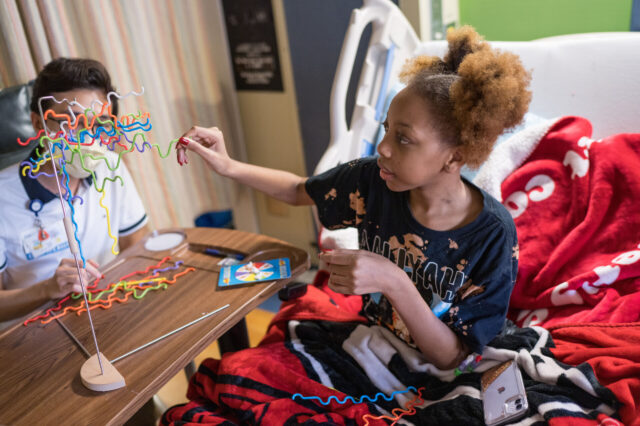Helping children cope with hospitalization
Here are some tips for talking with children and teens about a stay in the hospital.
Infant – Two Years
Children this young are not able to understand illness. Many times separation from parents is their main worry.
- Spend as much time as possible at your child’s bedside; hold, touch, rock and soothe
- If you are comfortable, try to be with your child during tests and procedures
- Bring your child’s favorite items from home
- Keep crib/bed as a safe zone, and treatment free area
- Maintain as much of a schedule as possible including naptime, and meals
- Allow time for your child each day for play; give choices; and offer toys and colorful objects to help keep him/her busy
- Record your voice and special messages for your child to play when you are not able to be at the hospital
Toddlers (Three Years – Five Years)
Children at this age think in terms of cause and effect. They may believe that their illness was caused by one specific action, thought or feeling. Remember to reassure your child that he/she did nothing to cause the illness and they are not being punished for anything. Explain all medical procedures in an honest and simple way, medical play sessions may be helpful. Remind your child that the tests and procedures are being done to try and help make them feel better. Let them know what their job is, for example the needle stick will pinch/hurt for a second and your job is to hold really still. Also, let your child know that it is okay to cry.
- Provide simple explanations of what is happening while your child is hospitalized and repeat often
- Comfort your child when he/she is upset or fearful by providing a favorite toy, hug, or singing. Tell staff what works to get your child to cooperate, you are the expert
- Provide choices when possible - Ex: “You must take your medicine, would you like it mixed in applesauce or pudding?”
- Allow for appropriate expression of feelings by talking, drawing, punching a pillow, and taking a walk
- Encourage medical play to rehearse or repeat experiences, this allows your child to learn ways to cope
- Maintain as much of your child’s daily schedule as possible including naps, meals and play
School Age (Six Years – 12 Years)
Children at this age are able to understand their illness better. They can recognize symptoms, and understand reality. In addition, your child’s friends are becoming more important in their lives. Try to arrange visits, phone calls, emails, and letters as much as possible.
- Give clear and honest explanations to help your child understand about diagnosis, treatment and hospitalization
- Include your child in discussions about diagnosis and treatment as much as possible
- Reassure your child that he/she is not responsible for his/her diagnosis
- Help your child identify feelings and teach them that sadness, anger and guilt are normal
- Suggest writing and recording thoughts and feelings
- Provide time during the day for play and fun
Adolescents (13 Years – 18 Years)
Teens can define illness by specific symptoms and can also understand the reasons for their symptoms. More information should be given about treatment and diagnosis. Teens are dependent on their peer groups, and it is important to provide opportunities for socialization with others their age.
- Offer comfort and empathy
- Include your teen in discussions about medical treatments and diagnosis
- Encourage your teen to ask questions
- Encourage expression of feelings to someone: parents, family, staff or friends
- Encourage journal keeping
- Understand some reluctance in talking about all thoughts and feelings
- Allow your teen private time with medical team
- Arrange visits for siblings and friends
- Find some time for something fun each day
Siblings
- Maintain your child’s routine as much as possible, ask family members or usual care providers to help
- Offer reassurance that mom/dad will be back
- Arrange visits to brother/sister in the hospital
- Give simple explanations about why their brother/sister is in the hospital
- Be alert to behavior changes, provide positive reinforcement for a supportive role in the family
- Inform teachers and caregivers of the situation
- Support the sibling having fun even though brother/sister is sick, make sure they don’t feel guilt or blame
- Encourage sibling to communicate feelings
- Send written, taped or telephone messages daily when a parent cannot be there
- Explain that a parent’s sadness, crying or distress is okay
- Answer questions honestly
